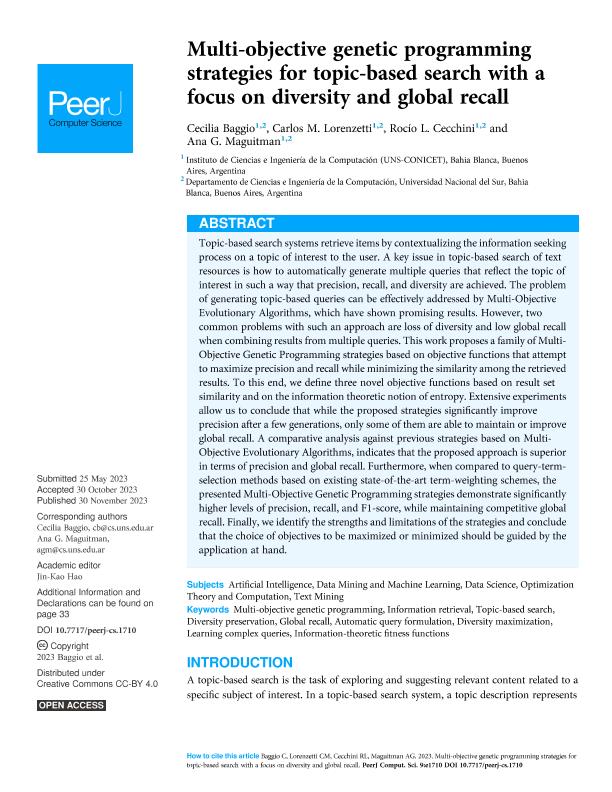Mostrar el registro sencillo del ítem
dc.contributor.author
Baggio, Cecilia

dc.contributor.author
Lorenzetti, Carlos Martin

dc.contributor.author
Cecchini, Rocío Luján

dc.contributor.author
Maguitman, Ana Gabriela

dc.date.available
2024-01-29T14:49:20Z
dc.date.issued
2023-11
dc.identifier.citation
Baggio, Cecilia; Lorenzetti, Carlos Martin; Cecchini, Rocío Luján; Maguitman, Ana Gabriela; Multi-objective genetic programming strategies for topic-based search with a focus on diversity and global recall; PeerJ Inc.; PeerJ Computer Science; 9; 11-2023; 1-39
dc.identifier.uri
http://hdl.handle.net/11336/225085
dc.description.abstract
Topic-based search systems retrieve items by contextualizing the information seeking process on a topic of interest to the user. A key issue in topic-based search of text resources is how to automatically generate multiple queries that reflect the topic of interest in such a way that precision, recall, and diversity are achieved. The problem of generating topic-based queries can be effectively addressed by Multi-Objective Evolutionary Algorithms, which have shown promising results. However, two common problems with such an approach are loss of diversity and low global recall when combining results from multiple queries. This work proposes a family of Multi-Objective Genetic Programming strategies based on objective functions that attempt to maximize precision and recall while minimizing the similarity among the retrieved results. To this end, we define three novel objective functions based on result set similarity and on the information theoretic notion of entropy. Extensive experiments allow us to conclude that while the proposed strategies significantly improve precision after a few generations, only some of them are able to maintain or improve global recall. A comparative analysis against previous strategies based on Multi-Objective Evolutionary Algorithms, indicates that the proposed approach is superior in terms of precision and global recall. Furthermore, when compared to query-term-selection methods based on existing state-of-the-art term-weighting schemes, the presented Multi-Objective Genetic Programming strategies demonstrate significantly higher levels of precision, recall, and F1-score, while maintaining competitive global recall. Finally, we identify the strengths and limitations of the strategies and conclude that the choice of objectives to be maximized or minimized should be guided by the application at hand.
dc.format
application/pdf
dc.language.iso
eng
dc.publisher
PeerJ Inc.
dc.rights
info:eu-repo/semantics/openAccess
dc.rights.uri
https://creativecommons.org/licenses/by/2.5/ar/
dc.subject
AUTOMATIC QUERY FORMULATION
dc.subject
DIVERSITY MAXIMIZATION
dc.subject
DIVERSITY PRESERVATION
dc.subject
GLOBAL RECALL
dc.subject
INFORMATION RETRIEVAL
dc.subject
INFORMATION-THEORETIC FITNESS FUNCTIONS
dc.subject
LEARNING COMPLEX QUERIES
dc.subject
MULTI-OBJECTIVE GENETIC PROGRAMMING
dc.subject
TOPIC-BASED SEARCH
dc.subject.classification
Ciencias de la Información y Bioinformática

dc.subject.classification
Ciencias de la Computación e Información

dc.subject.classification
CIENCIAS NATURALES Y EXACTAS

dc.title
Multi-objective genetic programming strategies for topic-based search with a focus on diversity and global recall
dc.type
info:eu-repo/semantics/article
dc.type
info:ar-repo/semantics/artículo
dc.type
info:eu-repo/semantics/publishedVersion
dc.date.updated
2023-12-26T14:16:12Z
dc.identifier.eissn
2376-5992
dc.journal.volume
9
dc.journal.pagination
1-39
dc.journal.pais
Estados Unidos

dc.journal.ciudad
San Diego
dc.description.fil
Fil: Baggio, Cecilia. Consejo Nacional de Investigaciones Científicas y Técnicas. Centro Científico Tecnológico Conicet - Bahía Blanca. Instituto de Ciencias e Ingeniería de la Computación. Universidad Nacional del Sur. Departamento de Ciencias e Ingeniería de la Computación. Instituto de Ciencias e Ingeniería de la Computación; Argentina. Universidad Nacional del Sur. Departamento de Ciencias e Ingeniería de la Computación; Argentina
dc.description.fil
Fil: Lorenzetti, Carlos Martin. Consejo Nacional de Investigaciones Científicas y Técnicas. Centro Científico Tecnológico Conicet - Bahía Blanca. Instituto de Ciencias e Ingeniería de la Computación. Universidad Nacional del Sur. Departamento de Ciencias e Ingeniería de la Computación. Instituto de Ciencias e Ingeniería de la Computación; Argentina. Universidad Nacional del Sur. Departamento de Ciencias e Ingeniería de la Computación; Argentina
dc.description.fil
Fil: Cecchini, Rocío Luján. Consejo Nacional de Investigaciones Científicas y Técnicas. Centro Científico Tecnológico Conicet - Bahía Blanca. Instituto de Ciencias e Ingeniería de la Computación. Universidad Nacional del Sur. Departamento de Ciencias e Ingeniería de la Computación. Instituto de Ciencias e Ingeniería de la Computación; Argentina. Universidad Nacional del Sur. Departamento de Ciencias e Ingeniería de la Computación; Argentina
dc.description.fil
Fil: Maguitman, Ana Gabriela. Consejo Nacional de Investigaciones Científicas y Técnicas. Centro Científico Tecnológico Conicet - Bahía Blanca. Instituto de Ciencias e Ingeniería de la Computación. Universidad Nacional del Sur. Departamento de Ciencias e Ingeniería de la Computación. Instituto de Ciencias e Ingeniería de la Computación; Argentina. Universidad Nacional del Sur. Departamento de Ciencias e Ingeniería de la Computación; Argentina
dc.journal.title
PeerJ Computer Science
dc.relation.alternativeid
info:eu-repo/semantics/altIdentifier/url/https://peerj.com/articles/cs-1710
dc.relation.alternativeid
info:eu-repo/semantics/altIdentifier/doi/http://dx.doi.org/10.7717/peerj-cs.1710
Archivos asociados
